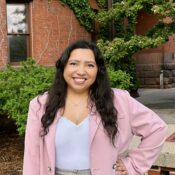
Speaker
Natalie Rivera
Counseling Psychology Doctoral Student, UW–Madison
Natalie Rivera, MS, is a 4th-year post-master’s doctoral student in the Counseling Psychology department at UW–Madison. She most recently served as the ‘23-’24 DDEEA community support specialist at the Counseling Psychology Training Clinic and completed the ‘21-’23 Esperanza Bilingual Psychological Services Training Certificate program. Informed by Liberation Psychology, Ms. Rivera is interested in using a critical lens to study identity and language within the Latine community and provide linguistically sensitive and culturally affirming therapy services to Spanish- and English-speaking college students. Her approach to her therapy practice is guided by Person-Centered therapy infused with a Radical Hope framework. She places emphasis on trusting the client’s strengths and cultural understandings while collaboratively exploring past and present experiences that can inform healing and growth. Outside of graduate school Ms. Rivera likes to attend live music events, try the local food and drinks scene, and stay connected with friends and family near and far.
Speaking in
Addressing the Mental Health Needs of Underrepresented Collegiate Students Through the Community Support Specialist Role at UW–Madison
On college campuses, BIPOC, first-generation and low-income students are disproportionately underrepresented in seeking mental health services, highlighting systemic disparities in access to support. In this session, the panelists plan to discuss the role of the Community Support Specialists (CSS), who work exclusively with DDEEA students. This position was created by the Counseling Psychology Training Clinic (CPTC) in partnership with UW-Madison’s Mental Health Services (MHS) to increase counseling access among underrepresented students at UW-Madison using a social justice framework. The speakers will present an overview of the program’s history, including data and testimonials from past DDEEA students. During the session, panelists will share their experiences in the CSS roles, including their positionalities as BIPOC graduate students responsible for supporting the mental health needs of other underrepresented students. They will address questions about various interventions for supporting students, such as individual therapy, the role of outreach, and creative methods for disseminating interventions.
Session Objectives
- An increased understanding of the rewards and obstacles faced by BIPOC mental health professionals while providing services to underrepresented students at a predominantly white college campus
- An awareness of the mental health resources on campus and the role of the Community Support Specialist
- Insight into the collaborations between CPTC and MHS in addressing systemic disparities faced by underrepresented students seeking mental health services
- Awareness of resources for supporting BIPOC students’ mental health needs